Letters from Frank John Mulcahy to his family, 1941-1945 - Part 1
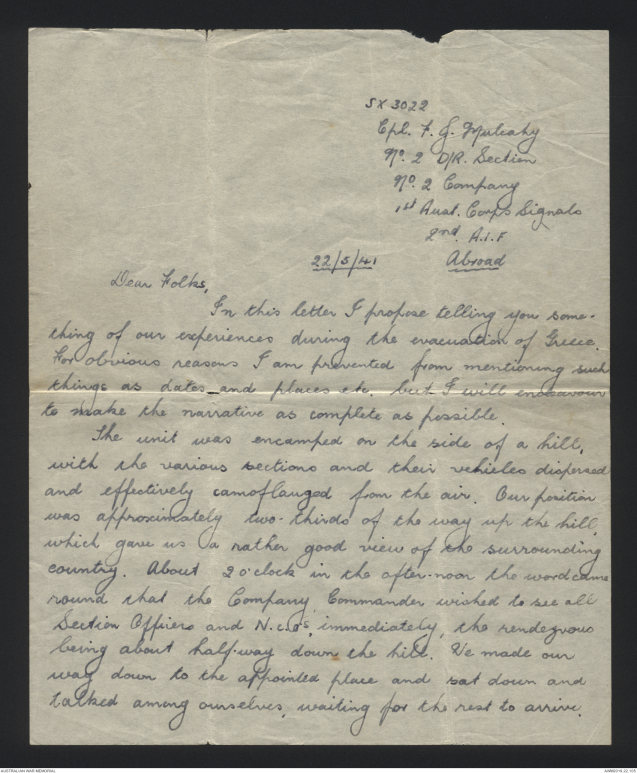
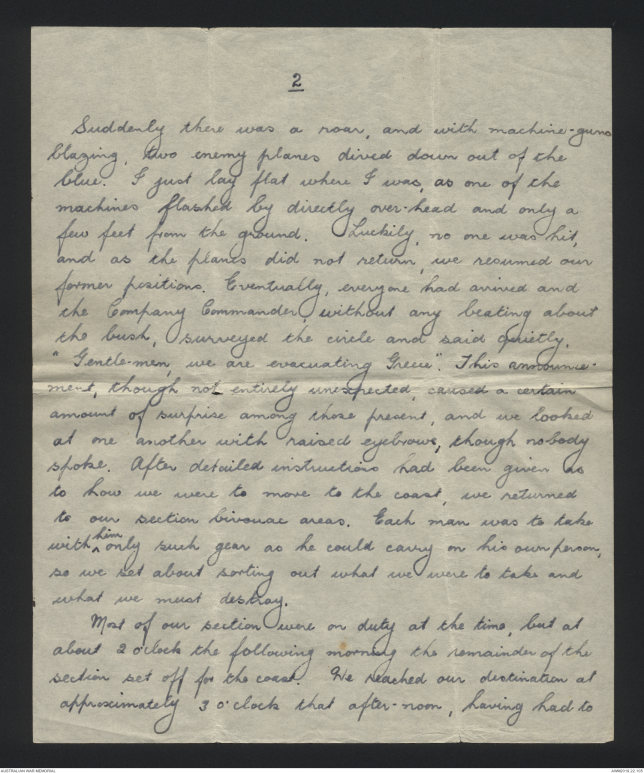
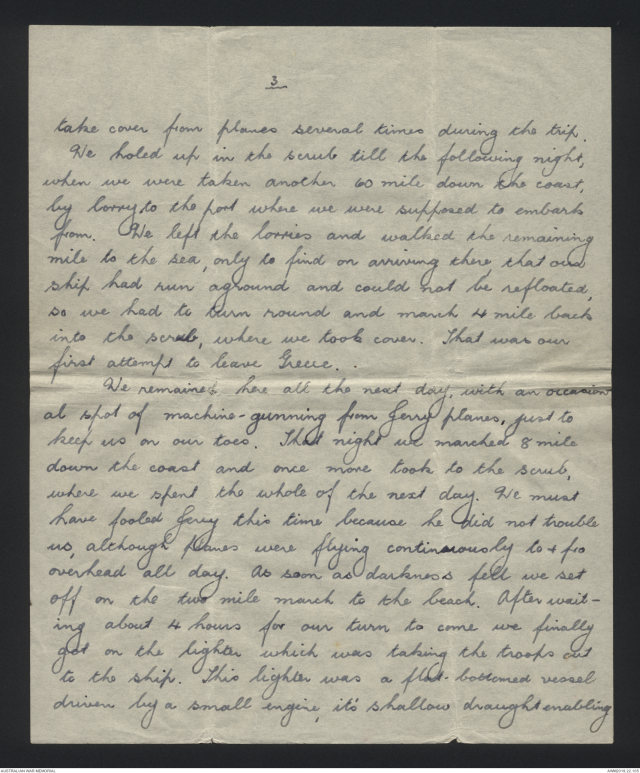
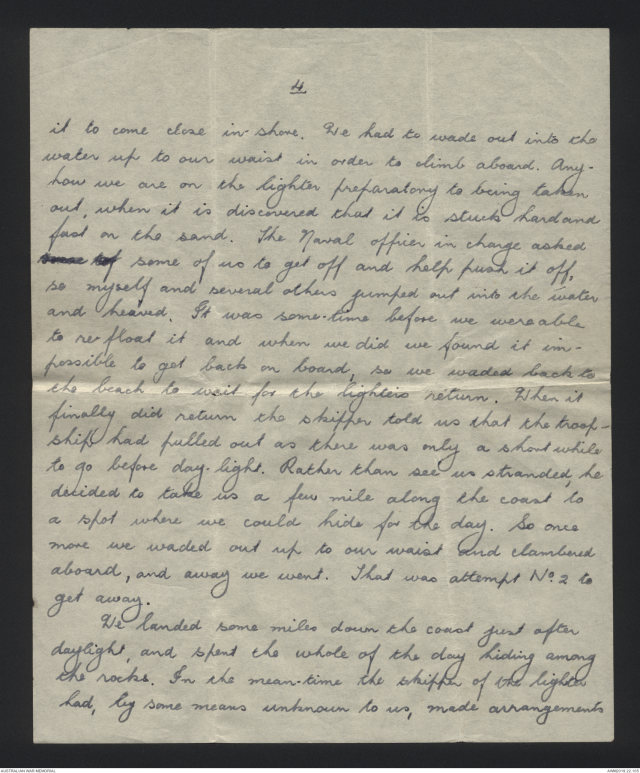
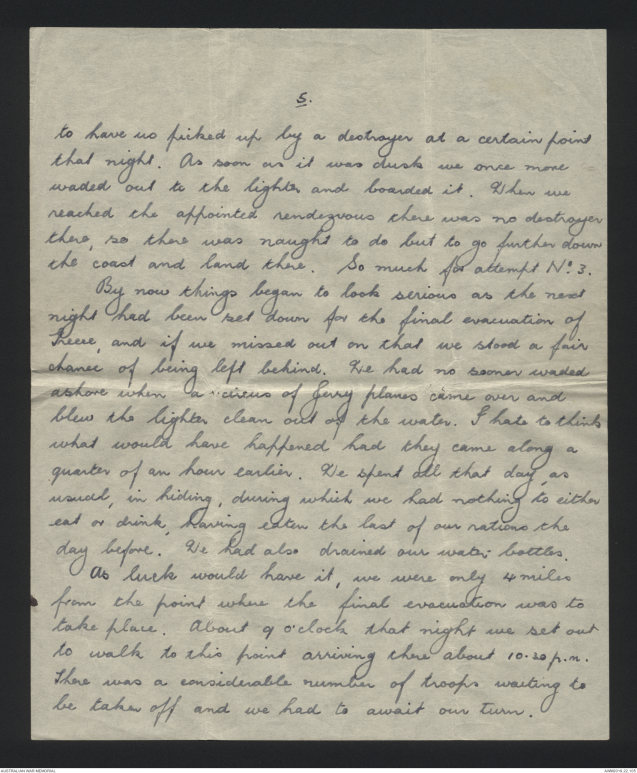
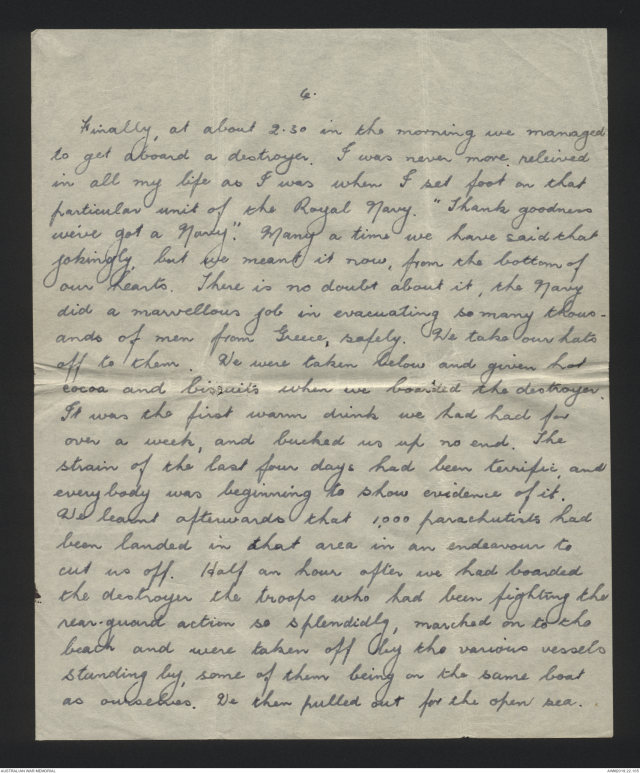
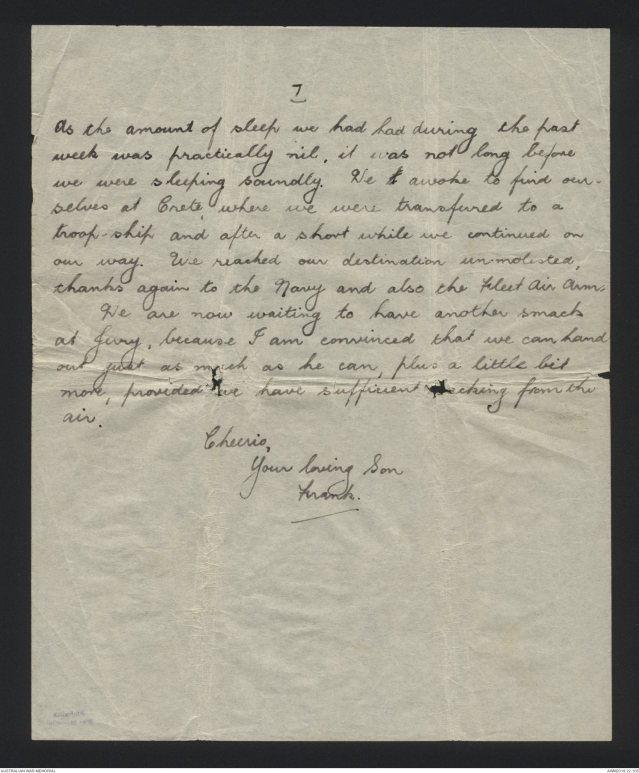
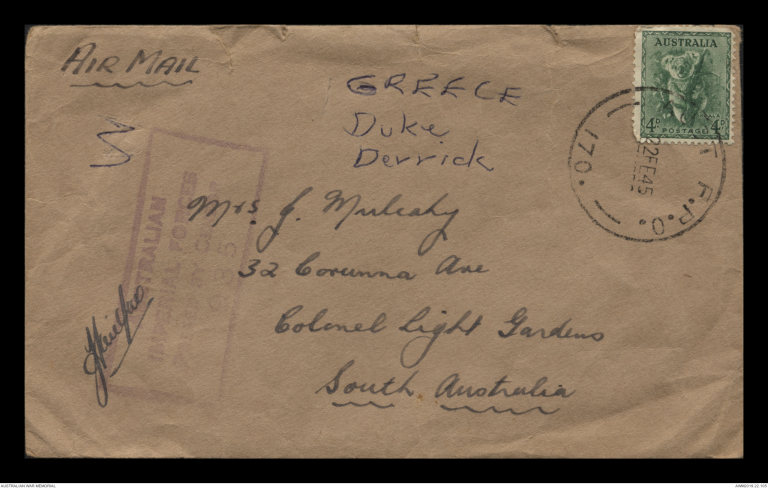
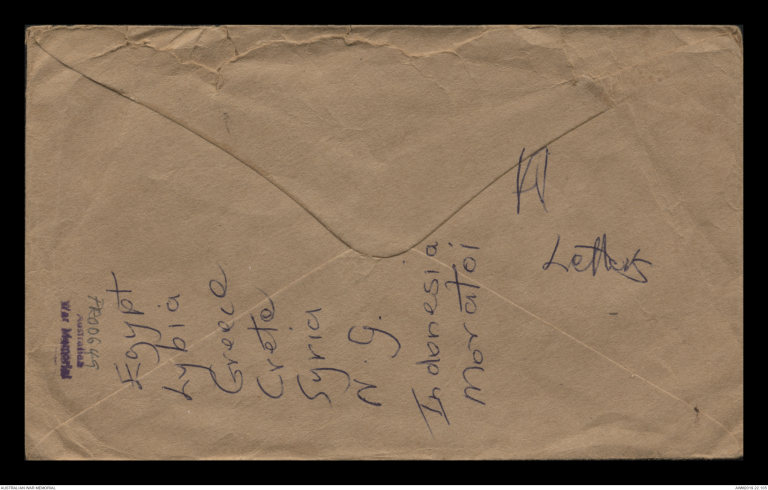
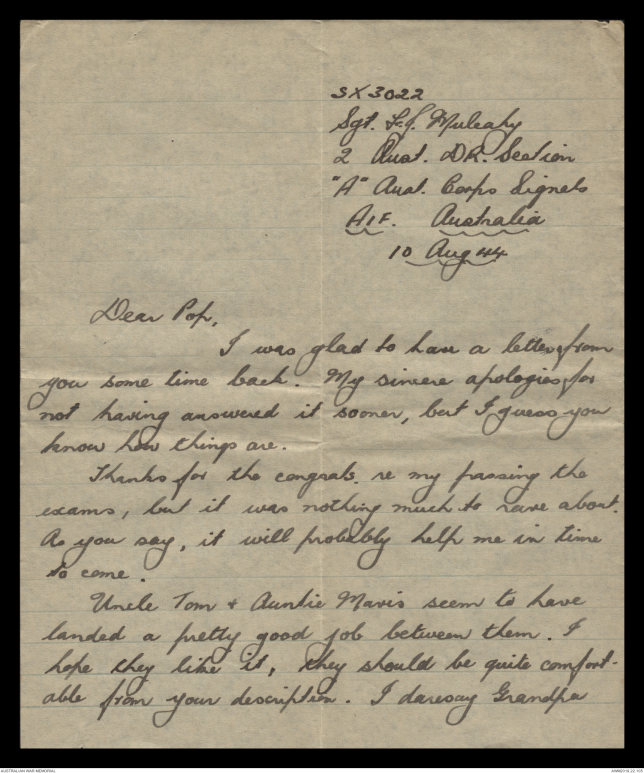
SX3022
Cpl. F. J. Mulcahy
No. 2 O/R. Section
No. 2 Company
1st Aust. Corps Signals
2nd A.I.F.
22/5/41 Abroad
Dear Folks,
In this letter I propose telling you something
of our experiences during the evacuation of Greece.
For obvious reasons I am prevented from mentioning such
things as dates and places etc. but I will endeavour
to make the narrative as complete as possible.
The unit was encamped on the side of a hill,
with the various sections and their vehicles dispersed
and effectively camouflaged from the air. Our position
was approximately two-thirds of the way up the hill,
which gave us a rather good view of the surrounding
country. About 2 o’clock in the afternoon the word came
round that the Company Commander wished to see all
Section Officers and N.C.O.'s immediately, the rendezvous
being about half-way down the hill. We made our
way down to the appointed place and sat down and
talked among ourselves, waiting for the rest to arrive.
2
Suddenly there was a roar, and with machine-guns
blazing, two enemy planes dived down out of the
blue. I just lay flat where I was, as one of the
machines flashed by directly over-head and only a
few feet from the ground. Luckily, no one was hit,
and as the planes did not return, we resumed our
former positions. Eventually, everyone had arrived and
the Company Commander, without any beating about
the bush, surveyed the circle and said quietly,
"Gentle-men, we are evacuating Greece". This announcement,
though not entirely unexpected, caused a certain
amount of surprise among those present, and we looked
at one another with raised eyebrows, though nobody
spoke. After detailed instructions had been given as
to how we were to move to the coast, we returned
to our section bivouac areas. Each man was to take
with ^him only such gear as he could carry on his own person,
so we set about sorting out what we were to take and
what we must destroy.
Most of our section were on duty at the time, but at
about 2 o’clock the following morning the remainder of the
section set off for the coast. We reached our destination at
approximately 3 o'clock that after-noon, having had to
3
take cover from planes several times during the trip.
We holed up in the scrub till the following night,
then we were taken another 60 mile down the coast,
by lorry to the port where we were supposed to embark
from. We left the lorries and walked the remaining
mile to the sea, only to find on arriving there that our
ship had run aground and could not be refloated,
so we had to turn round and march 4 mile back
into the scrub, where we took cover. That was our
first attempt to leave Greece.
We remained here all the next day with an occasional
spot of machine-gunning from Jerry planes, just to
keep us on our toes. That night we marched 8 mile
down the coast and once more look to the scrub,
where we spent the whole of the next day. We must
have fooled Jerry this time because he did not trouble
us, although planes were flying continuously to & fro
overhead all day. As soon as darkness fell we set
off on the two mile march to the beach. After waiting
about 4 hours for our turn to come we finally
got on the lighter which was taking the troops a
to the ship. This lighter was a flat-bottomed vessel
driven by a small engine, it's shallow draught enabling
4
it to come close in shore. We had to wade out into the
water up to our waist in order to climb aboard. Anyhow
we are on the lighter preparatory to being taken
out, when it is discovered that it to stuck hard and
fact on the sand. The Naval officer in charge askedsome of some of us to get off and help push it off,
so myself and several others jumped out into the water
and heaved. It was some time before we were able
to re-float it and when we did we found it impossible
to get back on board, so we waded back to
the beach to wait for the lighters return. When it
finally did return the skipper told us that the troop-ship
had pulled out as there was only a short while
to go before day-light. Rather than see us stranded, he
decided to take us a few mile along the coast to
a spot where we could hide for the day. So once
more we waded out up to our waist and clambered
aboard, and away we went. That was attempt No.2 to
get away.
We landed some miles down the coast just after
daylight, and spent she whole of the day hiding among
the rocks. In the mean-time the skipper of the lighter
had, by some means unknown to us, made arrangements
5
to have us picked up by a destroyer at a certain point
that night. As soon on it was dusk we once more
waded out to the lighter and boarded it. When we
reached the appointed rendezvous there was no destroyer
there, so there was naught to do but to go further down
the coast and land there. So much for attempt No.3.
By now things began to look serious as the next
night had been set down for the final evacuation of
Greece, and if we missed out on that we stood a fair
chance of being left behind. We had no sooner waded
ashore when a circus of Jerry planes came over and
blew the lighter clear out of the water. I have to think
what would have happened had they came along a
quarter of an hour earlier. We spent all that day, as
usual, in hiding, during which we had nothing to either
eat or drink, having eaten the last of our rations the
day before. We had also drained our water bottles.
As luck would have it, we were only 4 miles
from the point where the final evacuation was to
take place. About 9 o’clock that night we set out
to walk to this point arriving there about 10.30 p.m.
There was a considerable number of troops waiting to
be taken off and we had to await our turn.
6
Finally, at about 2.30 in the morning we managed
to get aboard a destroyer. I was never more relieved
in all my life as I was when I set foot on that
particular unit of the Royal Navy. "Thank goodness
we've got a Navy". Many a time we have said that
jokingly but we meant it now, from the bottom of
our hearts. There is no doubt about it, the Navy
did a marvellous job in evacuating so many thousands
of men from Greece, safely. We take our hats
off to them. We were taken below and given hot
cocoa and biscuits when we boarded the destroyer.
It was the first warm drink we had had for
over a week, and bucked us up no end. The
strain of the last four days had been terrific, and
every body was beginning to show evidence of it.
We leant afterwards that 1,000 parachuters had
been landed in that area in an endeavour to
cut us off. Half an hour after we had boarded
the destroyer the troops who had been fighting the
rear-guard action so splendidly, marched on to the
beach and were taken off by the various vessels
standing by, some of them being on the same boat
as ourselves. We then pulled but for the open sea.
7
As the amount of sleep we had had during the past
week was practically nil, it was not long before
we were sleeping soundly. We I awoke to find ourselves
at Crete, where we were transferred to a
troop-ship and after a short while we continued on
our way. We reached our destination unmolested,
thanks again to the Navy and also the Fleet Air Arm.
We are now waiting to have another smack
at Jerry, because I am convinced that we can hand
out just as much as he can, plus a little bit
more, provided we have sufficient backing from the
air.
Cheerio,
Your loving Son
Frank
AIR MAIL
GREECE
Duke
Derrick
Mrs J. Mulcahy
32 Corunna Ave
Colonel Light Gardens
South Australia
AUSTRALIAN
IMPERIAL FORCES
PASSED BY CENSOR
935
[[?]]
Australian
War Memorial
PR00649
Egypt
Lybia
Greece
Crete
Syria
N.G.
Indonesia
Moratoi
A
Letters
SX3022
Sgt. F.J. Mulcahy
2 Aust. DR Section
"A" Aust Corps Signals
AIF. Australia
10 Aug 44
Dear Pop,
I was glad to have a letter from
you some time back. My sincere apologies for
not having answered it sooner, but I guess you
know how things are.
Thanks for the congrats. re my passing the
exams, but it was nothing much to rave about.
As you say, it will probably help me in time
to come.
Uncle Tom & Auntie Mavis seem to have
landed a pretty good job between them. I
hope they like it, they should be quite comfortable
from your description. I daresay Grandpa
 Sandy Mudie
Sandy MudieThis transcription item is now locked to you for editing. To release the lock either Save your changes or Cancel.
This lock will be automatically released after 60 minutes of inactivity.